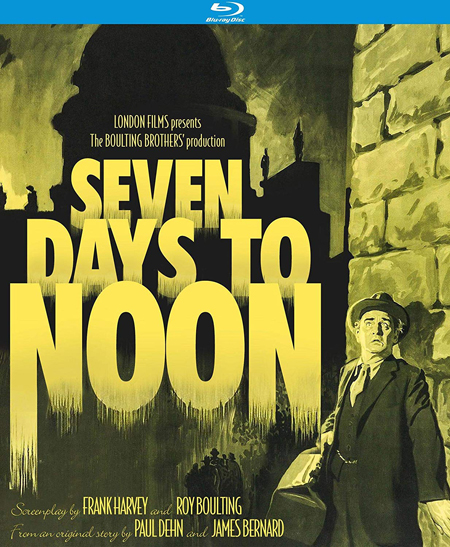
“NUCLEAR
NIGHTMAREâ€
By
Raymond Benson
It
was a surprise to discover this engaging, tightly-written and directed
thriller—released in 1950!—about a possible nuclear nightmare taking
place in London. In fact, the film was awarded the Oscar for Best Story (back
when that category still existed). The writers were Paul Dehn (who would years
later co-pen the script for Goldfinger and, after that, The Spy Who
Came in from the Cold) and James Bernard (primarily known as a film score
composer, best remembered for his work for Hammer horror pictures).
The
Boulting Brothers (identical twins!) were a sort of British Coen Brothers at the
time, having made numerous quality movies from the late 1930s to the 1970s,
usually directing separately. Seven Days to Noon is the only picture on
which both brothers are credited as directors.
While
the tale is fiction (and based on a novel), it plays as if it’s a true story. A
brilliant nuclear physicist, Professor Willingdon (Barry Jones) has written a
letter to the Prime Minister, saying that he’s stolen one of the suitcase-sized
nuclear bombs from the British weapons development facility, and he will
detonate it on the following Sunday at noon (seven days from the beginning of
the picture) if Britain does not announce the cessation of atomic weapons
creation. Willingdon goes into hiding to wait out the days, staying in shabby rooms-to-let
near the center of London. One of his landladies is the colorful (and morally
dubious) Goldie (Olive Sloane). Scotland Yard Superintendent Folland (Andre
Morrell) teams up with one of Willingdon’s colleagues, Lane (Hugh Cross), who
happens to be sweet on the professor’s daughter, Ann (Sheila Manahan), to try
and figure out Willingdon’s whereabouts.
The
picture goes into fine detail on how such a scenario might play out in the
city. For the first couple of days, the public is kept in the dark; but as the
deadline draws near, an evacuation must occur. A fifteen-mile radius is
determined to be the danger zone, and the filmmakers illustrate what a problem
this would entail.
The
result is a suspenseful, beat-the-clock doomsday picture that foreshadows by
almost fifteen years other similar cautionary movies like Dr. Strangelove or
Fail-Safe. The film moves quickly through its near-ninety-minute
runtime, generating tension and chills galore.
Kino
Lorber’s new Blu-ray restoration is a solid black and white, suitably grainy
presentation in 1920x1080p with optional English subtitles. Alas, there are no
supplements save for a theatrical trailer and some for other Kino releases.
Seven
Days to Noon is
terrific stuff, a shining feather in the cap of the British film industry.
CLICK HERE TO ORDER FROM AMAZON